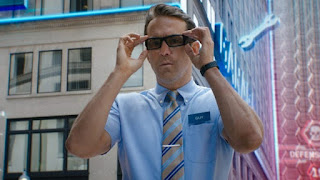Movie Review - Free Guy
This film is all about questioning or challenging the identity of the characters in the video game, independent of the human beings that might inhabit them. Wreck-It Ralph (2012) was the big-budget attempt on the big-screen that I first recall. However, there were previous attempts on the small screen that came to mind that I think did it better. Star Trek: The Next Generation (1987) had an episode in its second season called "Elementary, Dear Data." The episode featured what is essentially a video game character named Professor Moriarty that comes to life and thinks it's real. Black Mirror (2011) had an episode in its fourth season called "USS Callister." That episode also featured a video game character named Nanette that also comes to life.
Jodie Comer (Killing Eve) co-stars as Millie Rusk, a video game programmer who creates the artificial intelligence with fellow programmer named Keys, played by Joe Keery (Stranger Things). Millie isn't concerned about making money. She just wants to develop computer technology that is revolutionary and that pushes the evolution of technology forward. When a wealthy and eccentric businessman buys her technology, she doesn't take a job at the businessman's company. Keys does take a job with the businessman. The idea of a larger corporation taking advantage of smaller businesses or business-people or its workers or even creatives who don't care about money is here. Some might be more familiar with it, if one is familiar with HBO's Silicon Valley (2014).It's through Millie and Keys' struggle with the wealthy businessman named Antwan, played by Taika Waititi (JoJo Rabbit and Thor: Ragnarok) that we get this film's critique of gaming culture. It's only critique is that gaming culture is hyper-violent. It's not a super deep critique. For a deeper critique, one is better off checking out Dead Pixels (2019). This film is instead a bare-bones framework to have Reynolds' character do things that a character would do in a video-game but in a big-budget way that makes him a kind of live-action Wreck-It Ralph.
Reynolds' character isn't that deep in the first place. His character is no deeper than Chris Pratt's character in The Lego Movie (2014). Reynolds' character in several ways has the same arc as Pratt's character in The Lego Movie. His character of Guy is essentially a newbie to the gaming world, so he becomes a proxy to the uninitiated. There are cameos and references that people who watch Twitch or are hard-core gamers will appreciate. Otherwise, it has a rather lame emotional core that tries to get us invested in the relationship between Guy and Millie, but then veers away and tries to get us to invest in the relationship between Guy and Buddy, the African American friend, played by Lil Rel Howery (Bad Trip and Get Out). The film could've done more with that though.Rated PG-13 for strong fantasy violence, language and crude references.
Running Time: 1 hr. and 55 mins.
In theaters.













Comments
Post a Comment